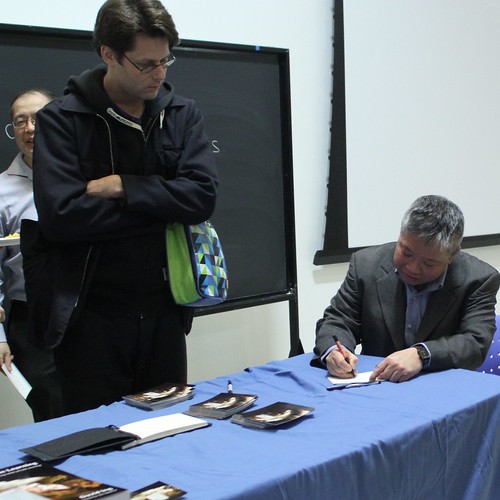Recordings of the book launch proceedings are now available as a web video playlist, and downloadable files.
Open Innovation Learning: Theory building on open sourcing while private sourcing was first released as a perfect bound softcopy and an open access PDF in November 2017. In February 2018, the ePub and Mobi editions were put online.
On February 21, a special session of Systems Thinking Ontario invited friends and colleagues to celebrate the publication that had taken most of the past three years in full-time research and writing. The recordings are available in 4 parts:
- 1. Welcome, by Peter Jones
- 2. Self-introductions by attendees in the audience
- 3. Highlights of the book, presented by David Ing
- 4. Commentary by Stephen Perelgut and Tim Lloyd, followed by questions from the audience
With family, friends and colleagues attending, this was one of the most memorable evenings of my life.
1. Welcome, by Peter Jones
As the official host of Systems Thinking Ontario at OCADU University, Peter Jones served as the master of ceremonies.
The files are also available for download onto a mobile device.
| Digital video (5m48s) |
H.264 MP4 | WebM |
| [20180221_1840_ST-ON OILTB_Jones HD_504kbps.m4v] (HD 504Kbps 28MB)[20180221_1840_ST-ON OILTB_Jones nHD_49kpbs.m4v] (nHD 49Kkps 8MB) |
[20180221_1840_ST-ON OILTB_Jones HD_826kbps.webm] (HD 826Kbps 45MB)[20180221_1840_ST-ON OILTB_Jones nHD_120kbps.webm] (nHD 120Kbps 13MB) |
|
| Digital audio (5m48s) |
[20180221_1840_ST-ON_OILTB_Launch_Welcome_PeterJones.mp3] (5MB) |
|
Peter explained the Nordic tradition of presenting dissertation research in a venue open to the public. While this gathering was not so formal, my participation with Systems Thinking Ontario and OCAD University made this assembly a natural session.
2. Self-introductions by attendees in the audience
The tradition at Systems Thinking Ontario meetings sees everyone in the room introducing himself or herself, and describing the context for coming to the meeting.
| Digital audio (9m50s) |
[20180221_1846_ST-ON_OILTB_Launch AttendeesSelfIntroductions.mp3] (9MB) |
|
In the interest of completeness, an audio artifact is available (without video tracking).
3. Highlights of the book, presented by David Ing
Most people interested in finding out about the book will be better off first listening to a presentation of highlights.
The presentation slides are available on the Coevolving Commons.
| Digital video (55m27s) |
H.264 MP4 | WebM |
| [20180221_1856_ST-ON OILTB_Ing HD_937kbps.m4v] (HD 937Kbps 440MB)[20180221_1856_ST-ON OILTB_Ing nHD_55kbps.m4v] (nHD 55Kkps 77MB) |
[20180221_1856_ST-ON OILTB_Ing HD_826kbps.webm] (HD 826Kbps 579MB)[20180221_1856_ST-ON OILTB_Ing nHD_171kbps.webm] (nHD 171Kbps 140MB) |
|
| Digital audio (55m27s) |
[20180221_1856_ST-ON_OILTB_Launch_Presentation_DavidIng.mp3] (51MB) |
|
This book was written primarily as a reference work. The body of the text aims to be scientific; the appendices with case studies is twice as long as the main body; and the footnotes are voluminous. In a verbal presentation, it seems as though most listeners were able to comprehend the general direction, sparking some ideas for further discussion.
4. Commentary by Stephen Perelgut and Tim Lloyd, followed by questions from the audience
The conventional structure for a Systems Thinking Ontario meeting is as a dialectic. Thus, one or two commenters give their personal impressions, as a way of encouraging further conversation.
| Digital video (35m39s) |
H.264 MP4 | WebM |
| [20180221_2010_ST-ON_OILTB Perelgut_Lloyd HD_850kbps.m4v] (HD 850Kbps 516MB)[20180221_2010_ST-ON_OILTB Perelgut_Lloyd nHD_44kbps.m4v] (nHD 44Kkps 47MB) |
[20180221_2010_ST-ON_OILTB Perelgut_Lloyd HD_2679kbps.webm] (HD 2679Kbps 765MB)[20180221_2010_ST-ON_OILTB Perelgut_Lloyd nHD_305kbps.webm] (nHD 305Kbps 126MB) |
|
| Digital audio (35m39s) |
[20180221_2010_ST-ON_OILTB_Launch_Commentary PeterJones_StephenPerelgut_TimLloyd.mp3] (33MB) |
|
Stephen Perelgut confirmed the history of open sourcing while private sourcing at IBM in the case study period of 2001-2011, and added that this practice has largely continued to the present day. Tim Lloyd spoke with some notes prepared in advance, discussing the research in context of Systems Thinking Ontario meetings, with a light roasting for the friendly audience. As a panel, we took questions from the audience at large.
With the formal part of the meeting completed, we adjourned for refreshments. Since the preferred form of the book is electronic, I signed postcards for friends who wanted a souvenir.
The formal launch of this book is a major personal milestone in my life. The act of writing led me to shift the philosophy underlying the systems sciences that I have studied since 1998. I expect that there’s still research work to come, but the depth and volume in the future is unlikely to approach this heft.



